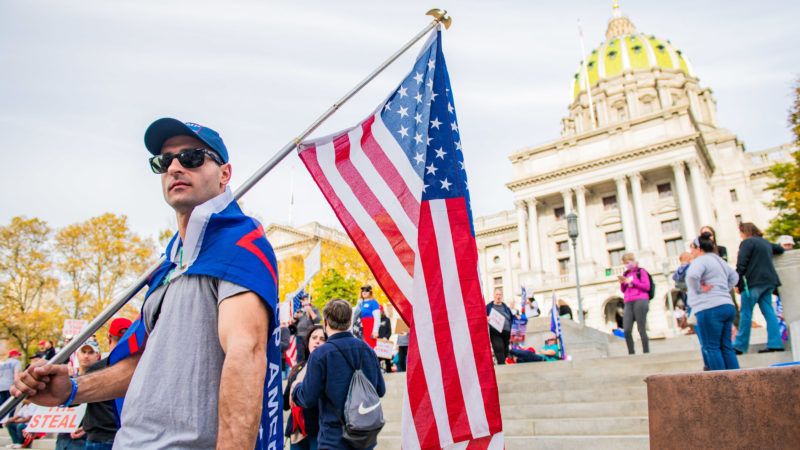Trump's New Lawsuit Looks Like an Attempt To Cancel All Mail-in Votes in Pennsylvania
The newest lawsuit in Pennsylvania is a longshot attempt to argue that all mail-in voting is unconstitutional because it differs from traditional, in-person voting. It's likely to fail.

Having so far failed to uncover any evidence of widespread voter fraud or substantiate claims of "irregularities" in last week's election, President Donald Trump's campaign has now launched its broadest legal effort yet aimed at overturning the apparent results of the election.
The lawsuit, filed Monday in the U.S. District Court for the Middle District of Pennsylvania, argues that "Pennsylvania has created an illegal two-tiered voting system" that runs afoul of the Equal Protection Clause of the U.S. Constitution by applying different standards to in-person voting and mail-in voting. Voters who appeared at the polls, the lawsuit argues, had their signatures verified in polling places monitored by poll-watchers who ensured votes were "counted in a transparent and verifiable, open, and observed manner."
Even though the signatures on mail-in ballots must also be verified against voter rolls, the Trump lawsuit argues that state officials "permitted the review and counting of mail-in ballots largely in secret with no monitoring." There's been no evidence of that, but the Trump campaign wants the federal courts to prevent state and county officials from certifying the results of the election—an outcome that could deny Biden the necessary electoral votes needed to win the race, depending on the final results in other states.
The Trump campaign's argument cites Bush v. Gore (2000), the Supreme Court ruling that halted the Florida recount after the 2000 presidential election. In that case, the Court ruled that states must grant the right to vote "on equal terms" and may not set rules that potentially value one person's vote over another. In Pennsylvania, Trump's lawsuit argues, the state has effectively done that because in-person votes were subjected to more oversight than mail-in votes.
But the ruling in Bush v. Gore was actually much narrower than the Trump lawsuit makes it sound. During the 2000 recount, different counties in Florida had different standards for determining voter intent when reviewing ballots with the infamous "hanging chads"—and, as a result, the same ballot might have been counted differently in one county versus another. That was unfair, the Court said.
That is not the issue here. At its heart, the new Trump lawsuit is an attempt to call into question the constitutionality of all mail-in ballots cast in federal elections, says Steve Vladeck, a University of Texas law professor.
To put it mildly, courts are unlikely to buy the idea that mail-in voting—which has been used for decades in American elections—is suddenly a violation of equal protection.
"The core idea of the complaint, that the different procedures for people to vote by mail versus voting in person constitutes an equal protection violation, is ludicrous," writes Rick Hasen, a professor of law and political science at the University of California, Irvine. Writing at the Election Law Blog, Hasen has a long list of other reasons why Trump's newest legal challenge will likely fail.
Trump was leading in Pennsylvania by about 700,000 late in the evening of Election Day. But because Pennsylvania is one of a handful of states that did not begin counting mail-in ballots prior to Election Day—and because mail-in ballots in the state have favored Biden by a ratio of nearly three-to-one—that lead dwindled in the following days as counties tallied up the absentee votes. Biden pulled ahead in Pennsylvania on Friday and the major media outlets called the race on Saturday morning. Pennsylvania's 20 electoral votes seem to have clinched the presidency for Biden, who leads in the state by about 40,000 on Tuesday as the counting continues.
You may recall that just before the election, Trump's team had won a small victory at the U.S. Supreme Court, which ruled that Pennsylvania must segregate mail-in ballots that arrived after Election Day. That pile of ballots could be the subject of additional Supreme Court scrutiny, but state officials say there are not enough late-arriving ballots to swing the outcome.
Other legal efforts have also flopped. A state judge on Friday dismissed a Trump campaign lawsuit that tried to disqualify so-called cured ballots—mail-in votes that could not be counted at first but that may be counted if the voter fixes the problem with the ballot within a limited period of time. In another case, Trump's campaign brought allegations that Republican poll-watchers were being excluded from vote-counting facilities in Philadelphia. Under questioning from a federal judge, the campaign's attorney admitted that, actually, that wasn't true.
Meanwhile, some Republican lawmakers in Pennsylvania are calling for a "legislative audit" of the state's election results. State Senate Majority Leader Jake Corman (R–Centre County) has acknowledged that there is no evidence of widespread voter fraud, but he has also warned that executive officials and the state Supreme Court undermined public confidence in the election's outcome by changing the rules for mail-in voting shortly before Election Day.
That's a legitimate gripe. But it does not come close to justifying an attempt to invalidate the fundamental practice of voting by mail.


Show Comments (371)